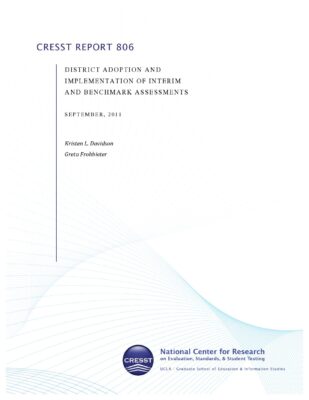Resource Hub
Explore guides, research papers, policy briefs, and tools to aid decisions on standards and assessments.
CRESST Report 806 – District Adoption and Implementation of Interim and Benchmark Assessments
As an outgrowth of the accountability requirements of the No Child Left Behind Act of 2001 (NCLB), districts are increasingly implementing interim or benchmark assessments. This report investigates various stakeholders’ original purposes in adopting interim or benchmark assessments, ensuing implementation efforts, and actual assessment uses. The report presents findings from interviews with 24 district administrators and 14 principals in seven districts across two states. Where applicable, this report compares interview data, compiled in 2011, of 30 teachers who participated in a larger study of classroom use of these assessments. District administrators often cited intentions that the assessments would be used to inform instruction. However, the realization of instructional purposes was limited by the type of information provided by predominantly multiple choice items, a lack of substantive professional development, and minimal coherence with respect to shared understandings of assessment purposes and uses across district, school, and classroom levels. Drawing from their results and other research, the authors provide recommendations for a successful interim or benchmark assessment system.


This report presents a well-conceived study of benchmark/interim assessments and the ways in which a range of stakeholders understand the nature and purpose of the assessments. The report provides an enlightening range of stakeholders’ differing perspectives based on the position held in the school system. This report presents important implications for the Smarter Balanced Assessment Consortium (Smarter Balanced) and the Partnership for Assessment of Readiness for College and Careers (PARCC).